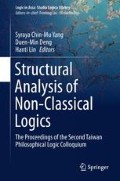Abstract
This paper shows how the probabilistic logic of communication and change can be used to reason about finite extensive-form games with incomplete or imperfect information and with probabilistic nature moves. The results of probabilistic behavioral strategies can be expressed, as well as the results of strategies that are sensitive not also just to the history of the game, but also to the beliefs of agents. Using this logic, game-theoretic concepts, such as best response, Nash equilibrium, and rationality can be expressed with respect to a finite set of possible strategies. Extensions to the logic are also proposed to allow for the comparison between one strategy and infinitely many others, thus providing less restricted expressions for best response, Nash equilibrium, and rationality.
The research by this author has been made possible by VIDI grant 639.072.904 of the Netherlands Organization of Scientific Research (NWO).
Access this chapter
Tax calculation will be finalised at checkout
Purchases are for personal use only
Notes
- 1.
We restrict to \(\mathfrak {E}^o(\mathcal {F})\) for simplicity. Without restricting to ordinary behavioral strategies, we might still want to impose further restrictions on \(\approx _a\) concerning whether agents b other than a must retain the same probabilistic beliefs about other agents’ moves. Such a restriction would be significant in how their epistemic behavioral strategies are played.
References
Achimescu, A.: Games and Logic for Informational Cascades. Master’s of Logic Thesis, ILLC (2014). http://www.illc.uva.nl/Research/Publications/Reports/MoL-2014-04.text.pdf
Achimescu, A., Baltag, A., Sack, J.: The probabilistic logic of communication and change. In: Presented at and Published in the Informal Proceedings of the Eleventh Conference on Logic and the Foundations of Game and Decision Theory (LOFT’11) (2014)
Achimescu, A., Baltag, A., Sack, J.: The Probabilistic Logic of Communication and Change, Manuscript (2015)
Alur, R., Henzinger, T., Kupferman, O.: Alternating-time temporal logic. J. ACM 49(5), 672–713 (2002)
Baltag, A., Smets, S., Zvesper, A.: Keep ‘hoping’ for rationality: a solution to the backward induction paradox. Synthese 169, 705–737 (2009)
van Benthem, J.: Rational dynamics and epistemic logic in games. Int Game Theory Rev 9(1), 13–45 (2007). (Erratum reprint, 9(2), 377–409)
van Benthem, J.: Logic in Games. MIT Press, Cambridge (2014)
van Benthem, J., van Eijck, J., Kooi, B.: Logics of communication and change. Inf. Comput. 204(11), 1620–1662 (2006)
Chatterjee, K., Henzinger, T., Piterman, N.: Strategy Logic. Inf. Comput. 208, 677–693 (2010)
Chen, T., Lu, J.: Probabilistic alternating-time temporal logic and model checking algorithm. In: Proceedings of the Fourth International Conference on Fuzzy Systems and Knowledge Discovery, 2007. FSKD 2007. pp. 35–39 (2007)
Fagin, R., Halpern, J.Y.: Reasoning about knowledge and probability. J. ACM 41(2), 340–367 (1994)
van der Hoek, W., Wooldridge, M.: Cooperation, knowledge, and time: alternating-time temporal epistemic logic and its applications. Studia Logica 75, 125–157 (2003)
Osborne, M.J., Rubinstein, A.: A Course in Game Theory. The MIT Press, Cambridge (1994)
Pauly, M., Parikh, R.: Game logic—an overview. Studia Logica 75, 165–182 (2003)
Sack, J., van der Hoek, W.: A modal logic for mixed strategies. Studia Logica 102, 339–360 (2014)
Acknowledgments
I would like to thank the reviewer for the valuable comments.
Author information
Authors and Affiliations
Corresponding author
Editor information
Editors and Affiliations
Rights and permissions
Copyright information
© 2016 Springer-Verlag Berlin Heidelberg
About this chapter
Cite this chapter
Sack, J. (2016). Logics for Dynamic Epistemic Behavioral Strategies. In: Yang, SM., Deng, DM., Lin, H. (eds) Structural Analysis of Non-Classical Logics. Logic in Asia: Studia Logica Library. Springer, Berlin, Heidelberg. https://doi.org/10.1007/978-3-662-48357-2_8
Download citation
DOI: https://doi.org/10.1007/978-3-662-48357-2_8
Published:
Publisher Name: Springer, Berlin, Heidelberg
Print ISBN: 978-3-662-48356-5
Online ISBN: 978-3-662-48357-2
eBook Packages: Religion and PhilosophyPhilosophy and Religion (R0)

